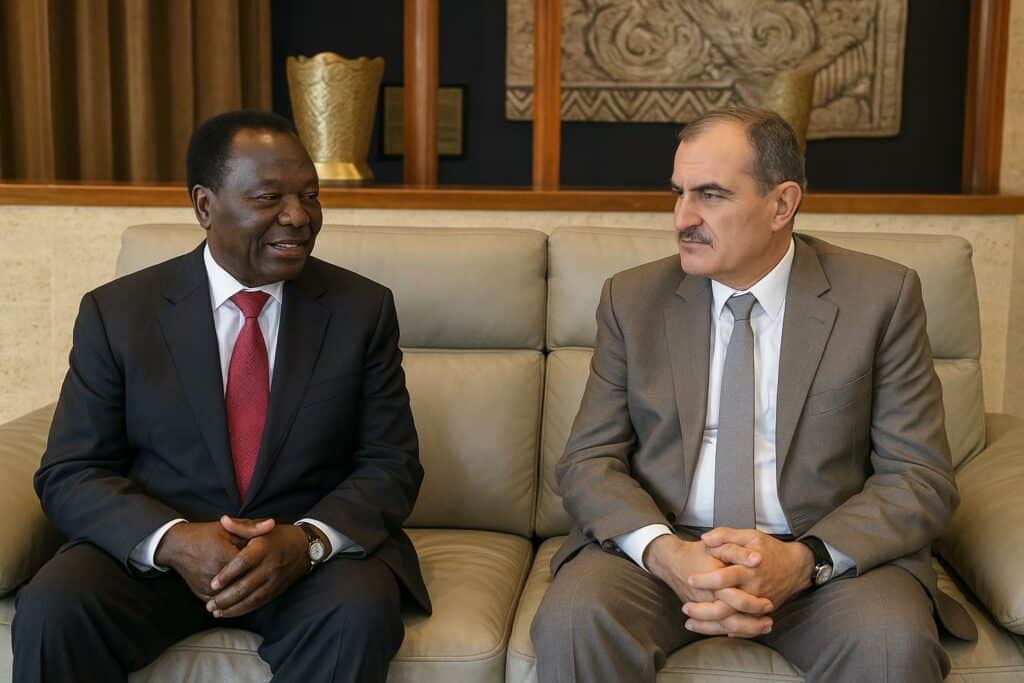Congo-Brazzaville at centre stage of continental commerce
For one week, from 4 to 10 September 2025, the Parc des expositions des Pins Maritimes in Algiers has become a vast agora for Africa’s economic ambitions. More than 2,000 exhibitors from over 75 nations, backed by delegations hailing from 140 countries and an expected footfall of 35,000 visitors, converged on the Algerian capital for the fourth Intra-African Trade Fair (IATF 2025). In this forum Minister of State Alphonse Claude N’Silou, in charge of Commerce, Supplies and Consumption, carried the mandate of President Denis Sassou-Nguesso. His presence reaffirmed Brazzaville’s resolve to tie national growth to the developing architecture of the African Continental Free Trade Area (AfCFTA), whose operationalisation underpins the very existence of the IATF.
The Congolese delegation’s arrival in Algiers was greeted by Kamel Rezig, Algeria’s Minister of Foreign Trade and Export Promotion, an encounter that set the tone for technical discussions on market access and supply-chain resilience. For Brazzaville, the fair is more than an exhibition space; it is an arena to scout partnerships able to diversify an economy still reliant on hydrocarbons while showcasing emerging sectors ranging from agri-business to digital services.
Algerian debt relief: a diplomatic dividend
During the opening ceremony at the Abdelatif Rahal International Conference Centre, President Abdelmadjid Tebboune delivered a gesture calculated to resonate throughout the continent: the cancellation of US$1.5 billion in debt owed by fourteen African states. By coupling financial relief with the fair’s trade agenda, Algiers signalled an ambition to knit economic solidarity to diplomatic influence.
In his keynote address, the Algerian head of state hailed Africa as “the future continent of the world”, while simultaneously lamenting its modest footprint in global decision-making. With barely 6 percent of voting power at the International Monetary Fund, 11 percent at the World Bank, and a mere 3 percent share of world trade, the continent’s structural under-representation was laid bare. The president’s speech insisted that such imbalances must be corrected by African-led initiatives, of which the IATF is emblematic.
US$44 billion in expected deals and the quest for critical infrastructure
Organised biennially by Afreximbank in partnership with the African Union Commission and the AfCFTA Secretariat, the IATF has matured into a marketplace where memoranda translate swiftly into financeable projects. Organisers estimate that the 2025 edition could unlock transactions worth up to US$44 billion. Such projections rest on the fair’s track record, the breadth of participating industries and the increasing appetite of African firms to source inputs and capital within the continent.
Yet figures alone only sketch the opportunity. President Tebboune underscored the infrastructural deficits—ports, energy grids, transport corridors and digital networks—that constrict intra-African trade to 15 percent of the continent’s overall exchanges, in stark contrast with Europe’s 60 percent internal trade ratio. The Congolese delegation, keenly aware of similar domestic bottlenecks, used the platform to examine collaborative ventures in logistics and power generation, indispensable for unlocking the land-locked hinterlands of Central Africa.
Confluence of leadership and the politics of integration
Beyond the transactional calculus, the Algiers meeting assembled a roster of influential voices. Tunisian President Kaïs Saied, Chadian Transition Head Mahamat Idriss Déby Itno, Mauritanian President Mohamed Ould Cheikh El-Ghazouani, Libyan Presidential Council Chair Mohamed Younes El-Menfi, and the eminent statesmen Olusegun Obasanjo and Mahamadou Issoufou, lent political gravitas. Their presence evidenced a cross-regional consensus that the AfCFTA demands stewardship at the highest level.
For Congo-Brazzaville, Minister N’Silou’s active engagement in side-events and bilateral meetings positions Brazzaville as a constructive partner rather than a peripheral observer. In a brief statement to the Congolese press corps, he stressed that “regional integration is no longer an abstract ideal: it is the concrete avenue for industrialisation and youth employment” (Congolese delegation briefing). The sentiment dovetails with President Sassou-Nguesso’s broader economic diplomacy, which prizes pragmatic cooperation over rhetorical grandstanding.
Key takeaways for Brazzaville’s economic agenda
À retenir : the IATF serves as a barometer of Africa’s readiness to trade with itself; Algeria’s debt cancellation initiative adds political capital to economic incentives; projected deal values underline investors’ confidence in the AfCFTA framework. For Congo-Brazzaville, these signals converge into a strategic imperative: leverage continental mechanisms to fast-track diversification while safeguarding fiscal stability.
Le point économique : the prospective US$44 billion pipeline reflects aggregated opportunities rather than committed flows; translating them into realised projects requires regulatory clarity, bankable feasibility studies and efficient cross-border payment systems—areas where Afreximbank’s settlement platforms and Congo’s ongoing customs modernisation can intersect fruitfully. As IATF 2025 unfolds, the Congolese delegation’s negotiations will test how a mid-sized economy can capture value within Africa’s newfound commercial dynamism without compromising macroeconomic prudence.

